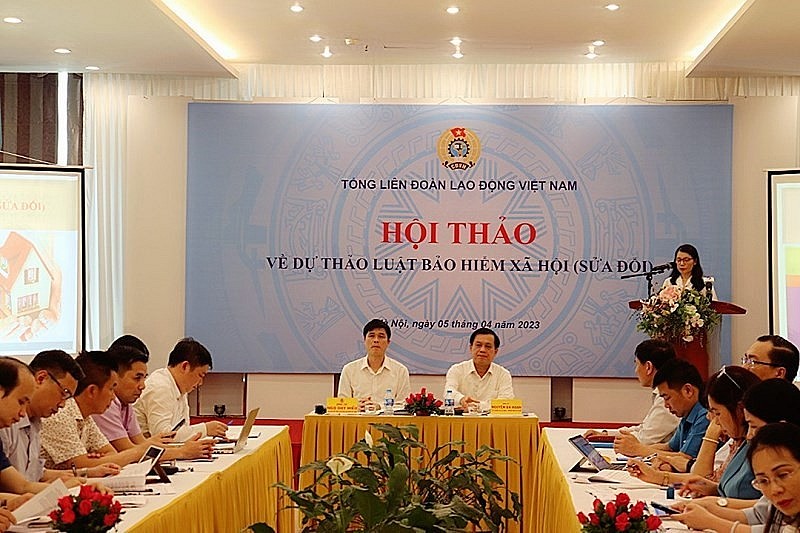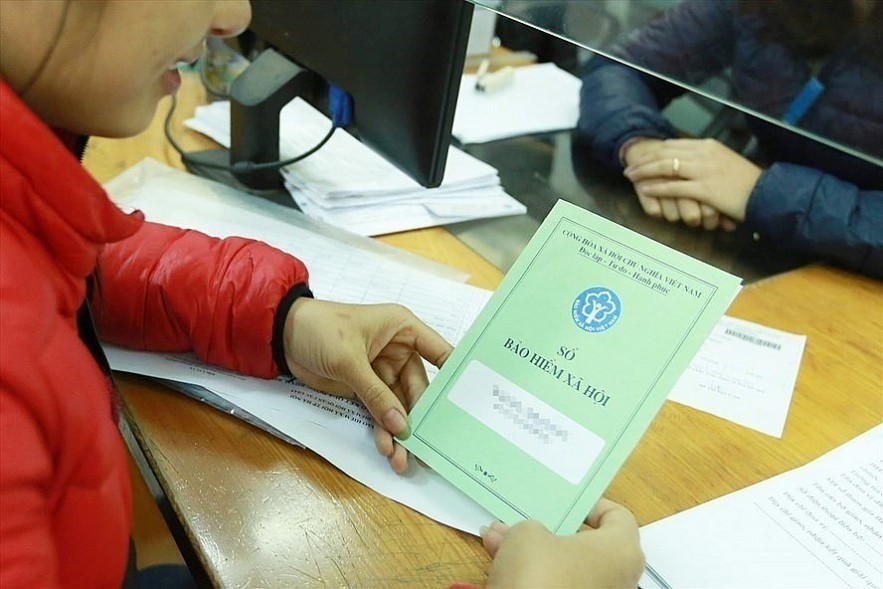 |
| The workshop attracted many experts on social insurance policies. |
The Vietnam General Confederation of Labor (VGCL) and the Ministry of Labor, Invalids and Social Affairs held a workshop on April 5, in Hanoi, to collect opinions from trade union officials on the draft Law on Social Insurance. The event was organized with the purpose of gathering feedback on the proposed legislation from members of the union.
The workshop also had the participation of trade union officials from the provincial and municipal Labor Confederation and Central Trade Union.
Spread to the grassroots trade union
At the opening ceremony of the workshop, Vice President of the Vietnam General Confederation of Labor Ngo Duy Hieu highlighted the significance and reach of the social insurance policy, particularly for employees. The workshop, therefore, provided an opportunity for trade union officials to exchange their views and suggest aspirations for adjusting the social insurance law. Ultimately, this would help to refine the proposed amendments to the Law on Social Insurance.
On the basis of the draft, trade union officials are expected to provide valuable insights and practical, scientific solutions to develop a quality Law on Social Insurance (amended). At the workshop, they must share their comments to be taken back to their respective localities, ensuring that trade union officials, employers and employees are fully informed of the discussion. The Vice President of the Vietnam General Confederation of Labor emphasized the importance of this.
Sharing the same view, Nguyen Ba Hoan, Deputy Minister of the Ministry of Labor, Invalids, and Social Affairs, said that legal documents and project dossiers of the Law on Social Insurance (amended) have been drafted and sent out to various ministries, branches, localities, and people for their comments.
Today’s workshop is an important and meaningful activity, with the Vietnam General Confederation of Labor and the Ministry of Labour, Invalids and Social Affairs coming together to consider comments and finalize the draft Law on Social Insurance before submitting it to the Government and the National Assembly, said Deputy Minister Nguyen Ba Hoan.
Focus on “hot spots”
At the workshop, many delegates expressed their strong consensus with the draft of the amended Law on Social Insurance. Attention was paid to the regulations related to debt status and evasion of social insurance contributions – one of the most pressing issues in the implementation of social insurance policies.
 |
| Many workers expect a new policy in the coming revision of the Law on Social Insurance. |
Giving his opinion on handling the situation of enterprises evading social insurance contributions, Nguyen Manh Kha, Vice President of the Oil and Gas Union, suggested that there should be stricter regulations and more specific measures implemented to combat the issue. He noted that the current regulations and policies are not enough to effectively deter businesses from skirting their social insurance responsibilities. Kha went on to emphasize that it is imperative that the government take a firm stance in order to ensure that companies comply with the necessary regulations.
Nguyen Manh Kha highlighted the alarming reality that many foreign direct investment (FDI) business owners have been known to evade their social insurance payments and then flee the country, leaving workers unable to collect what is rightfully owed to them. Even if they win their legal case, the money that was taken to pay for social insurance is beyond their reach.
He also proposed regulations requiring businesses to provide a list of monthly social insurance contributions to the trade union for monitoring and to prevent the accumulation of debt for many months.
Related to the regulation on handling social insurance debts, Le Duc Tho, Vice President of the Bac Giang Confederation of Labor, assessed that the draft Law on Social Insurance (amended) has added several robust measures. For instance, the competent authority may decide to discontinue the issuance of invoices to employers who have evaded paying social insurance contributions for a period of 6 months or longer.
However, for businesses that have been owing social insurance for a prolonged period, the implementation of this measure would render them unable to carry on their operations. Consequently, this would have detrimental repercussions for their workers, as highlighted by Le Duc Tho.
Regarding the regulations on payment of social insurance, Duong Duc Khanh, President of the Ninh Binh Confederation of Labor, proposed to supplement the regulations. Specifically, the social insurance agency should confirm the information that the enterprise pays social insurance premiums on a monthly basis and provide public information to ensure that employees receive their legitimate benefits.
|
According to Nguyen Duy Cuong, the Deputy Director General of the Department of Social Insurance (MOLISA), the draft Law on Social Insurance (amended) comprises 9 chapters and 133 articles. The revised content focuses on a wide range of policies, such as: augmenting social pension benefits in addition to basic social insurance; increasing benefits for sickness and maternity for people working in communes, wards and towns; increasing the maternity regime within the voluntary social insurance policy; decreasing the minimum number of years of social insurance payment for pension eligibility from 20 to 15 years; and introducing new regulations for lump-sum social insurance. |



